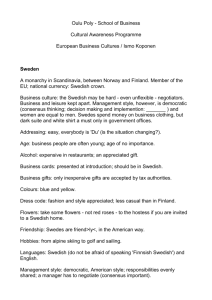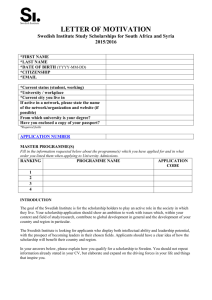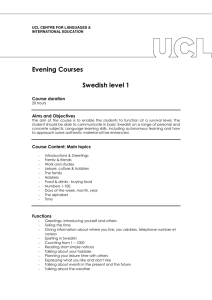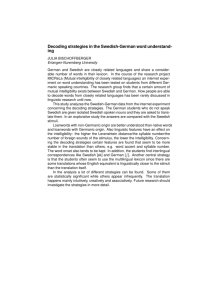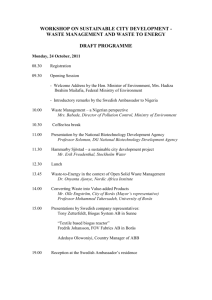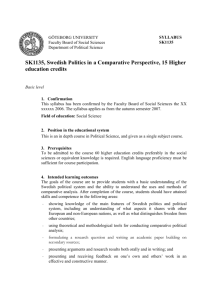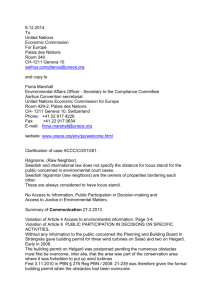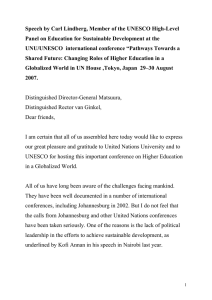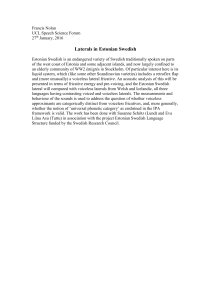SWEDCO
advertisement
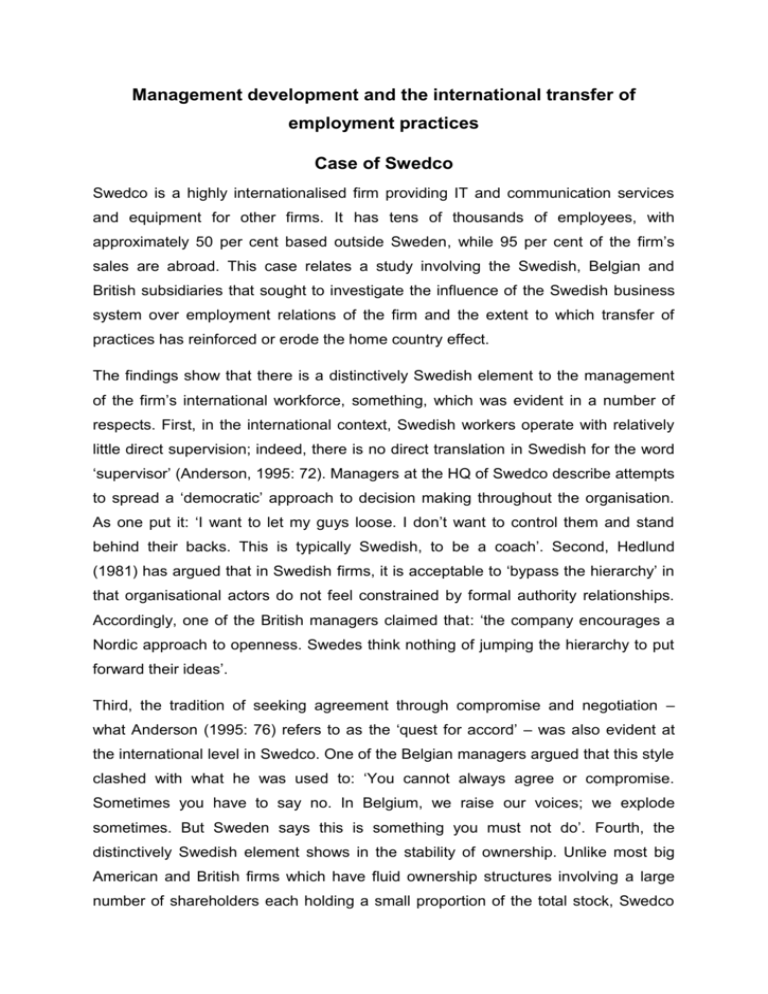
Management development and the international transfer of employment practices Case of Swedco Swedco is a highly internationalised firm providing IT and communication services and equipment for other firms. It has tens of thousands of employees, with approximately 50 per cent based outside Sweden, while 95 per cent of the firm’s sales are abroad. This case relates a study involving the Swedish, Belgian and British subsidiaries that sought to investigate the influence of the Swedish business system over employment relations of the firm and the extent to which transfer of practices has reinforced or erode the home country effect. The findings show that there is a distinctively Swedish element to the management of the firm’s international workforce, something, which was evident in a number of respects. First, in the international context, Swedish workers operate with relatively little direct supervision; indeed, there is no direct translation in Swedish for the word ‘supervisor’ (Anderson, 1995: 72). Managers at the HQ of Swedco describe attempts to spread a ‘democratic’ approach to decision making throughout the organisation. As one put it: ‘I want to let my guys loose. I don’t want to control them and stand behind their backs. This is typically Swedish, to be a coach’. Second, Hedlund (1981) has argued that in Swedish firms, it is acceptable to ‘bypass the hierarchy’ in that organisational actors do not feel constrained by formal authority relationships. Accordingly, one of the British managers claimed that: ‘the company encourages a Nordic approach to openness. Swedes think nothing of jumping the hierarchy to put forward their ideas’. Third, the tradition of seeking agreement through compromise and negotiation – what Anderson (1995: 76) refers to as the ‘quest for accord’ – was also evident at the international level in Swedco. One of the Belgian managers argued that this style clashed with what he was used to: ‘You cannot always agree or compromise. Sometimes you have to say no. In Belgium, we raise our voices; we explode sometimes. But Sweden says this is something you must not do’. Fourth, the distinctively Swedish element shows in the stability of ownership. Unlike most big American and British firms which have fluid ownership structures involving a large number of shareholders each holding a small proportion of the total stock, Swedco has three large shareholders who control nearly three-quarters of the voting shares and have done so for decades. Consequently, in an industry characterised by significant restructuring in recent years, involving a number of ‘hostile’ take-overs, Swedco has expanded internationally by ‘greenfield’ investment and through a series of collaborative joint ventures and ‘friendly’ acquisitions. This evidence of a ‘country of origin effect ‘ is very significant; even in a highly internationalised MNC the nature of the domestic business system shapes the management of the international workforce. However, the evidence also indicate that the country of origin effect is being eroded as senior management seeks to draw more actively on practices originating from other business systems. This process was most apparent in compensation and management development practices. The first of these is the development of ‘flexible’ or ‘variable’ compensation systems. An international policy working group involving HR managers from across Swedco has recently introduced bonus systems that are linked to individual and company performance. In addition, for every senior manager, there is a ‘Short Term Incentive Plan’’, which rewards the achievement of immediate goals. Moreover, four years ago, all employees were given the right to subscribe to a convertible share debenture scheme, something that about 40 per cent of staff worldwide has joined. Perhaps most significantly, an individual performance-related pay scheme, in which an employee’s performance is assessed against specific targets, affects all employees across the group worldwide. These variable forms of compensation appear to have much in common with practices, which have become popular in America and Britain during the last two decades. A similar process of adopting ‘Anglo-American’ style practices was evident in relation to management development. In recent years the HQ has made a concerted effort to develop a cadre of managers from across the multinational. Subsidiaries have been encouraged to submit nominations for individuals who should be considered for promotion to position elsewhere in the firm, a group known as ‘high potentials’. The identification of such ‘high potentials’ as part of an international cadre of managers is, according to Ferner and Varul (1999), a common trait of British and America MNCs. More generally, in Swedco the British operations appear to have been particularly influential in the formation of policy on management development. The manager of the firm’s ‘Management Institute’ indicated that: ‘When I am developing a training programme for managers, I always include the UK. Firstly, it ensures I get the language right but, secondly, there are lot of good training and management development ideas in the UK that I would like to benefit from. I always bring someone from the UK site onto the team. We are also developing links with UK universities such as Cranfield and LSE’. Source: Edwards, T. (2011) in A. W. Harzing, and A. H. Pinnington (eds.) International Human Resource Management, 3rd Edition Chapter 8 (pp. 283-285) Exercise After reading this case and drawing on relevant lectures and course material address the following issues/questions: 1. Identify and discuss the four elements that make Swedo distinctly Swedish and how these are evident in the management of Swedco’s international workforce. 2. What are the main areas where Swedo wants to depart from the distinctively Swedish management practices and why? 3. Briefly outline Swedco’s approach to international management development (creating a cadre of international managers). 4. How did Swedco use management development strategies and practices to reinforce and or erode the ‘home country effect’ in the management of its international operations?
